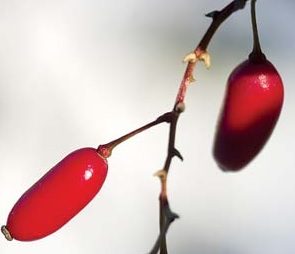Barberry

  | Barberry in TCM:Explore the properties of Barberry according to Chinese
Nutrition and Traditional Chinese Medicine (TCM):
Temperature: cool
Channels: LU, ST, SP, UB, LV, GB, Uterus
Flavors: bitter
Special Properties:
circulates qi, clears heat
In TCM terms barberry regulates qi and clears heat from several organs including the lung, liver, and gallbladder. It can also be used for several damp heat conditions including dysentery, jaundice, and eczema, but it is not specifically indicated for dampness. There are about 500 species, and Berberis vulgaris is the best known medicinally. In TCM only the dry crust from the roots and stem is used for medicinal purposes, but other cultures also used the berries as medicine. The active subtances of Barberry have the following properties: hemostatic, diuretic, vasodilator, hypertensive, antibacterial (kills bacteria and parasites), and anti-inflammatory
One study reports that it is superior to metformin in treating polycystic ovary syndrome. Today, it is the most widely used drug in homeopathic medicine for kidney pain and the removal of kidney stones. It was used in India to treat dysentery and in Europe to treat liver and gallbladder ailments. As a gallbladder tonic, the fruit can boost the flow of bile. Russian healers used barberry for inflammation, high blood pressure and abnormal uterine bleeding, while Iranians valued the plant for its anti-arrhythmic and sedative effects. Barberry has been touted for helping the urinary and digestive tracts, the skin and even the mind. A study published in the journal Pharmacological Research found barberry to be the best overall antioxidant when compared to 109 other non-Berberis species. It is also used in cases where there is discomfort around the heart and is believed to strengthen heart function.
Barberry, which contains berberine, is also antimicrobial. Berberine can treat intestinal infections, such as bacterial dysentery, because it is antagonistic to the likes of E. coli, salmonella, shigella, giardia and even cholera. It acts partly by preventing microbes from latching onto human cells. Clinically berberine is used in the treatment of bacterial diarrhea, intestinal parasitic infections, and ocular trachoma infections. Barberry is also rich in other alkaloids which can stabilize heart disorders, such as tachycardia (rapid heartbeat) and ventricular fibrillation.
Barberry extracts also can help with hypertension and nervous system disorders like epilepsy and convulsions. They assist potassium movement and relax blood vessels, thereby reducing blood pressure. Barberry further helps regulate potassium currents in the brain, which might account for its sedative and neuroprotective benefits. Extracts used in these animal studies were prepared with water, using a tea made from the berries.
Preparation:
Barberry can be found on the market under the forms of tea, tincture, pills and ointment. Usually the percentage of berberine from those products is between 8-12 percent. To decoct boil some Barberry bark in a cup of water for 5 minutes, after which cool and strain. Take 2 cups a day at the most, half an hour before dinner.
When consuming prepared tincture, it should be consumed three times a day in doses of 1-2ml.
Against conjunctivitis the use of cataplasms with powdered barberry crust is recommended.
Wash for eczema: A decoction of B. vulgaris can be used as a wash for Damp Heat type eczema with redness and irritation, in addition to taking Berberis internally as a single herb or in combination.
Warnings / Contraindications:
Exceding the recommended dose can lead nausea, vomit, dizziness, convulsions, nosebleeds, kidney failure, swelling of the skin, swelling of the eyes, and may also cause a blood sugar decrease. The mixtures made from crust of barberry are forbidden to children, pregnant women, during menstruation, or women in lactation. Always consult with your physician before taking this herb in combination with any other herbs or medicatons.
Disclaimer: In accordance with our terms of service, by using this web site you agree that none of the information found on this web site constitutes medical advice. You should always consult your doctor before trying any particular food or herbal remedy to treat disease.
Folk remedies presented on this site are designed to address specifc TCM diagnoses, and are not one-size-fits-all. If you would like to learn more about Traditional Chinese Medicine (TCM) and how it relates to Chinese Nutrition, you can book in a free call with a licensed professional. There is no obligation to purchase.
[CLICK HERE for your free INITIAL CONSULTATION] |

